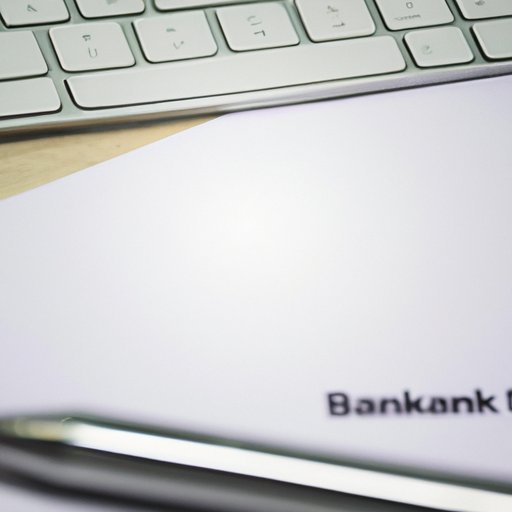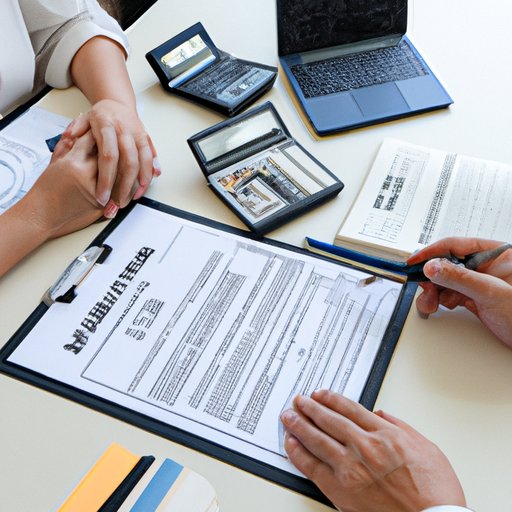Introduction
Business credit is an important factor in the success of any small business. It’s used to secure financing, establish vendor relationships, and build trust with lenders. Establishing and maintaining a good credit rating is essential for businesses that want to grow and thrive.
Having a good business credit score allows you to access better financing rates and terms, as well as open doors to new opportunities. Building business credit is a process that takes time and effort, but it’s worth it in the end. Here’s what you need to know about getting started.
Research the Available Options
Before you start your business credit journey, it’s important to understand the different types of credit options available. There are credit cards, loans, and lines of credit, each of which has its own advantages and disadvantages. Take some time to compare the different options and decide which one is best for your business.
Compare Credit Cards
Credit cards are one of the most popular forms of business credit. They offer flexibility and convenience, as well as rewards points and other benefits. When researching credit cards, look for ones with low interest rates, generous rewards programs, and no annual fees. You should also take into consideration the credit limit, repayment terms, and other factors.
Look Into Loans & Lines of Credit
Loans and lines of credit are two other common forms of business credit. Both offer different benefits, depending on the lender and the type of loan. Some loans may have higher interest rates, while others may have longer repayment terms. Lines of credit are ideal for businesses that need access to funds quickly and can provide flexibility when it comes to repayment.
Get an Employer Identification Number (EIN)
An Employer Identification Number (EIN) is a unique nine-digit number assigned to businesses by the Internal Revenue Service (IRS). This number is used for tax purposes and is required for businesses that want to apply for credit.
What is an EIN?
An EIN is a unique nine-digit number assigned by the IRS. It’s used to identify businesses for tax purposes and is required for businesses that want to apply for credit.
How to Obtain an EIN
Obtaining an EIN is simple and straightforward. All you need to do is fill out an online application on the IRS website. The application will ask for basic information about your business, such as the name, address, and type of business. Once the application is approved, you will receive your EIN within a few days.

Establish a Separate Business Bank Account
Having a separate business bank account is essential for tracking expenses and managing cash flow. It also makes it easier to monitor your business’s financial health and provides a clear picture of your financial situation.
Benefits of Having a Separate Account
A separate business bank account offers several benefits, including improved organization, better cash flow management, and increased security. It also makes it easier to track expenses, prepare financial statements, and apply for credit. Additionally, having a separate account helps protect your personal assets in case of legal action against your business.
Steps to Open a Business Bank Account
Opening a business bank account is easy and can usually be done in a few minutes. All you need to do is provide the bank with your EIN, business license, and other documents. Depending on the bank, you may also need to provide proof of ownership or a business plan. Once all the documents are submitted, the bank will review them and open your account.
Set Up a Business Profile with Experian, Equifax, and Dun & Bradstreet
Setting up a business profile with Experian, Equifax, and Dun & Bradstreet is essential for building business credit. These companies collect information about businesses and use it to generate credit reports and scores. By setting up profiles with these companies, you can keep track of your business credit and make sure it’s accurate.
Benefits of Establishing a Profile
Establishing a profile with Experian, Equifax, and Dun & Bradstreet has several benefits. These companies provide detailed information about your business, such as payment history and credit utilization. This information is used to generate credit reports and scores, which can help you secure financing and build trust with lenders. Additionally, having profiles with these companies can help you monitor your business credit and make sure it’s accurate.
Steps to Create a Business Profile
Creating a business profile with Experian, Equifax, and Dun & Bradstreet is easy and can usually be done in a few minutes. All you need to do is provide basic information about your business, such as the name, address, and type of business. Once the profile is set up, you can monitor your business credit and make sure it’s accurate.
Apply for a Business Credit Card
Applying for a business credit card is a great way to start building your business credit. Business credit cards typically offer higher credit limits and better rewards than personal cards. They also come with perks such as travel rewards, cash back, and discounts on business expenses.
Types of Business Credit Cards
There are several types of business credit cards available, each with its own benefits and drawbacks. Some cards offer low interest rates, while others offer generous rewards programs and no annual fees. Before you apply for a card, take some time to compare the different options and decide which one is best for your business.
Steps to Apply for a Business Credit Card
Applying for a business credit card is a straightforward process. All you need to do is fill out an online application with basic information about your business, such as the name, address, and type of business. Once the application is approved, you’ll receive your card in the mail.

Negotiate Terms with Vendors that Report to Credit Bureaus
Negotiating terms with vendors that report to credit bureaus is another great way to build business credit. When you negotiate payment terms, such as extended payment periods or discounts, vendors are more likely to report positive information to the credit bureaus. This can help improve your credit score and make it easier to get financing in the future.
Benefits of Negotiating
Negotiating payment terms with vendors that report to credit bureaus has several benefits. It can help improve your credit score and make it easier to get financing in the future. Additionally, it can help you save money on purchases and reduce the amount of time spent dealing with paperwork. According to a study by the Small Business Administration, businesses that negotiate payment terms with vendors “have better access to capital, lower borrowing costs, and more favorable terms from creditors.”
Tips & Strategies
When negotiating payment terms with vendors, it’s important to be prepared. Research the vendor and make sure you understand their payment policies before negotiating. Additionally, try to be flexible and open to compromise. You may not get everything you want, but you may be able to reach an agreement that works for both parties.

Make Sure You Pay Your Bills on Time
Making timely payments is essential for building and maintaining a good business credit score. Late payments can have a negative impact on your credit score, so it’s important to stay on top of your payments.
Benefits of Prompt Payment
Paying your bills on time has several benefits. It can help improve your credit score and make it easier to get financing in the future. Additionally, it can help you build strong relationships with vendors and increase your chances of getting better terms in the future.
Tips & Strategies
Staying on top of your payments is key to maintaining a good business credit score. Make sure you read all invoices carefully and double-check the due dates. Additionally, set up automated payments if possible, and create reminders for yourself. This will help ensure that you never miss a payment.
Conclusion
Building business credit is a process that takes time and effort, but it’s worth it in the end. To get started, it’s important to research the available options, obtain an EIN, set up a business profile with Experian, Equifax, and Dun & Bradstreet, apply for a business credit card, negotiate terms with vendors that report to credit bureaus, and make sure you pay your bills on time. By following these steps, you can start building your business credit and reap the benefits of having good credit.
(Note: Is this article not meeting your expectations? Do you have knowledge or insights to share? Unlock new opportunities and expand your reach by joining our authors team. Click Registration to join us and share your expertise with our readers.)
